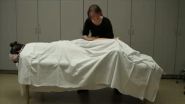(Press-News.org) Irvine, Calif., April 17, 2014 — By discovering a new mechanism that allows blood to enter the brain immediately after a stroke, researchers at UC Irvine and the Salk Institute have opened the door to new therapies that may limit or prevent stroke-induced brain damage.
A complex and devastating neurological condition, stroke is the fourth-leading cause of death and primary reason for disability in the U.S. The blood-brain barrier is severely damaged in a stroke and lets blood-borne material into the brain, causing the permanent deficits in movement and cognition seen in stroke patients.
Dritan Agalliu, assistant professor of developmental & cell biology at UC Irvine, and Axel Nimmerjahn of the Salk Institute for Biological Studies developed a novel transgenic mouse strain in which they use a fluorescent tag to see the tight, barrier-forming junctions between the cells that make up blood vessels in the central nervous system. This allows them to perceive dynamic changes in the barrier during and after strokes in living animals.
While observing that barrier function is rapidly impaired after a stroke (within six hours), they unexpectedly found that this early barrier failure is not due to the breakdown of tight junctions between blood vessel cells, as had previously been suspected. In fact, junction deterioration did not occur until two days after the event.
Instead, the scientists reported dramatic increases in carrier proteins called serum albumin flowing directly into brain tissue. These proteins travel through the cells composing blood vessels – endothelial cells – via a specialized transport system that normally operates only in non-brain vessels or immature vessels within the central nervous system. The researchers' work indicates that this transport system underlies the initial failure of the barrier, permitting entry of blood material into the brain immediately after a stroke (within six hours).
"These findings suggest new therapeutic directions aimed at regulating flow through endothelial cells in the barrier after a stroke occurs," Agalliu said, "and any such therapies have the potential to reduce or prevent stroke-induced damage in the brain."
His team is currently using genetic techniques to block degradation of the tight junctions between endothelial cells in mice and examining the effect on stroke progression. Early post-stroke control of this specialized transport system identified by the Agalliu and Nimmerjahn labs may spur the discovery of imaging methods or biomarkers in humans to detect strokes as early as possible and thereby minimize damage.
INFORMATION:
Study results appear today in the early online edition of Neuron. Daniel Knowland, Ahmet Arac, Martin Hsu and Sarah Lutz of UC Irvine; Kohei Sekiguchi of the Salk Institute; and John Perrino, Gary Steinberg and Ben Barres of Stanford University contributed to the research, which received support from the American Heart Association (grant 12BGIA11560014), the National Multiple Sclerosis Society (grant RG4673A1/1) and the National Institutes of Health (grant 1R01 HL116995-01).
About the University of California, Irvine: Located in coastal Orange County, near a thriving employment hub in one of the nation's safest cities, UC Irvine was founded in 1965. One of only 62 members of the Association of American Universities, it's ranked first among U.S. universities under 50 years old by the London-based Times Higher Education. The campus has produced three Nobel laureates and is known for its academic achievement, premier research, innovation and anteater mascot. Led by Chancellor Michael Drake since 2005, UC Irvine has more than 28,000 students and offers 192 degree programs. It's Orange County's second-largest employer, contributing $4.3 billion annually to the local economy.
Media access: UC Irvine maintains an online directory of faculty available as experts to the media at today.uci.edu/resources/experts.php. Radio programs/stations may, for a fee, use an on-campus ISDN line to interview UC Irvine faculty and experts, subject to availability and university approval. For more UC Irvine news, visit news.uci.edu. Additional resources for journalists may be found at communications.uci.edu/for-journalists
NOTE TO EDITORS: Photo available at:
http://news.uci.edu/press-releases/study-ids-new-cause-of-brain-bleeding-immediately-after-stroke/
Study IDs new cause of brain bleeding immediately after stroke
Research by UCI, Salk Institute points to novel therapies for minimizing damage
2014-04-17
ELSE PRESS RELEASES FROM THIS DATE:
20 years of data shows treatment technique improvement for advanced abdominal cancer
2014-04-17
WINSTON-SALEM, N.C. – April 17, 2014 – Meaningful long-term survival is possible for selected patients suffering from advanced cancer of the abdomen when treated with cytoreductive surgery with Hyperthermic IntraPeritoneal Chemotherapy, or HIPEC, according to a first-of-its-size analysis by physicians at Wake Forest Baptist Medical Center.
Wake Forest Baptist has the largest reported, single-center experience with cytoreductive surgery and HIPEC, said lead author Edward A. Levine, M.D., and analysis of 20 years' worth of patient data shows that outcomes have clearly improved ...
Surprising material could play role in saving energy
2014-04-17
One strategy for addressing the world's energy crisis is to stop wasting so much energy when producing and using it, which can happen in coal-fired power plants or transportation. Nearly two-thirds of energy input is lost as waste heat.
Now Northwestern University scientists have discovered a surprising material that is the best in the world at converting waste heat to useful electricity. This outstanding property could be exploited in solid-state thermoelectric devices in a variety of industries, with potentially enormous energy savings.
An interdisciplinary team led ...
How vision makes sure that little fish do not get carried away
2014-04-17
This news release is available in German. Our eyes not only enable us to recognise objects; they also provide us with a continuous stream of information about our own movements. Whether we run, turn around, fall or sit still in a car – the world glides by us and leaves a characteristic motion trace on our retinas. Seemingly without effort, our brain calculates self-motion from this "optic flow". This way, we can maintain a stable position and a steady gaze during our own movements. Together with biologists from the University of Freiburg, scientists from the Max Planck ...
Massage therapy improves circulation, eases muscle soreness
2014-04-17
VIDEO:
Massage therapy improves general blood flow and alleviates muscle soreness after exercise, according to a study by researchers at the University of Illinois at Chicago.
Click here for more information.
Massage therapy improves general blood flow and alleviates muscle soreness after exercise, according to a study by researchers at the University of Illinois at Chicago.
The study, reported online in advance of print in the Archives of Physical Medicine and Rehabilitation, ...
Food shortages could be most critical world issue by mid-century
2014-04-17
WASHINGTON, D.C. -- The world is less than 40 years away from a food shortage that will have serious implications for people and governments, according to a top scientist at the U.S. Agency for International Development.
"For the first time in human history, food production will be limited on a global scale by the availability of land, water and energy," said Dr. Fred Davies, senior science advisor for the agency's bureau of food security. "Food issues could become as politically destabilizing by 2050 as energy issues are today."
Davies, who also is a Texas A&M AgriLife ...
Internet use may cut retirees' depression
2014-04-17
Spending time online has the potential to ward off depression among retirees, particularly among those who live alone, according to research published online in The Journals of Gerontology, Series B: Psychological Sciences and Social Sciences. In the article "Internet Use and Depression Among Retired Older Adults in the United States: A Longitudinal Analysis," the authors report that Internet use reduced the probability of a depressed state by 33 percent among their study sample.
Late-life depression affects between 5 and 10 million Americans age 50 and older. This new ...
A cross-section of the universe
2014-04-17
An image of a galaxy cluster taken by the NASA/ESA Hubble Space Telescope gives a remarkable cross-section of the Universe, showing objects at different distances and stages in cosmic history. They range from cosmic near neighbours to objects seen in the early years of the Universe. The 14-hour exposure shows objects around a billion times fainter than can be seen with the naked eye.
This new Hubble image showcases a remarkable variety of objects at different distances from us, extending back over halfway to the edge of the observable Universe. The galaxies in this image ...
Researcher looks at public perceptions around newborn testing
2014-04-17
TORONTO, April 17, 2014—While 94 per cent of Canadians surveyed said they would participate in public health programs that screen newborns for a specific number of genetic conditions, only 80 per cent said they would be willing to participate in screening that would sequence their newborns' genomes.
Most newborns in North America have a "heel prick test" in their first day or two of life in which a tiny amount of blood is taken from their heels and tested for about five to 54 conditions, depending on the state or province. Some conditions commonly tested for include cystic ...
Adrenaline does little to increase patient's survival after cardiac arrest
2014-04-17
TORONTO, April 17, 2014— Giving patients adrenaline after they suffer a cardiac arrest outside of a hospital does not increase their prospects of surviving long-term, according to new research conducted at St. Michael's Hospital.
"The vast number of patients who have a cardiac arrest get adrenaline, which has been the drug recommended in treating cardiac arrest for decades," said Dr. Steve Lin, an emergency physician and trauma team leader at St. Michael's. "Yet, despite advances in medical treatment, long-term survival rates of patients who suffer a cardiac outside a ...
Animal study provides first evidence that gel can prevent multiple virus transmission in vagina/rectum
2014-04-17
NEW YORK (17 April 2014)— Population Council scientists and their partners have found that their proprietary microbicide gel is safe, stable, and can prevent the transmission of multiple sexually transmitted infections (STIs) in both the vagina and rectum in animals: HIV, herpes simplex virus 2 (HSV-2), and human papillomavirus (HPV). The USAID-funded study also provides the first data that the gel is effective against multiple strains of HIV, and has a window of efficacy in the vagina against all three viruses of at least eight hours prior to exposure. A Phase 1 safety ...
LAST 30 PRESS RELEASES:
Scientists discover “bacterial constipation,” a new disease caused by gut-drying bacteria
DGIST identifies “magic blueprint” for converting carbon dioxide into resources through atom-level catalyst design
COVID-19 vaccination during pregnancy may help prevent preeclampsia
Menopausal hormone therapy not linked to increased risk of death
Chronic shortage of family doctors in England, reveals BMJ analysis
Booster jabs reduce the risks of COVID-19 deaths, study finds
Screening increases survival rate for stage IV breast cancer by 60%
ACC announces inaugural fellow for the Thad and Gerry Waites Rural Cardiovascular Research Fellowship
University of Oklahoma researchers develop durable hybrid materials for faster radiation detection
Medicaid disenrollment spikes at age 19, study finds
Turning agricultural waste into advanced materials: Review highlights how torrefaction could power a sustainable carbon future
New study warns emerging pollutants in livestock and aquaculture waste may threaten ecosystems and public health
Integrated rice–aquatic farming systems may hold the key to smarter nitrogen use and lower agricultural emissions
Hope for global banana farming in genetic discovery
Mirror image pheromones help beetles swipe right
Prenatal lead exposure related to worse cognitive function in adults
Research alert: Understanding substance use across the full spectrum of sexual identity
Pekingese, Shih Tzu and Staffordshire Bull Terrier among twelve dog breeds at risk of serious breathing condition
Selected dog breeds with most breathing trouble identified in new study
Interplay of class and gender may influence social judgments differently between cultures
Pollen counts can be predicted by machine learning models using meteorological data with more than 80% accuracy even a week ahead, for both grass and birch tree pollen, which could be key in effective
Rewriting our understanding of early hominin dispersal to Eurasia
Rising simultaneous wildfire risk compromises international firefighting efforts
Honey bee "dance floors" can be accurately located with a new method, mapping where in the hive forager bees perform waggle dances to signal the location of pollen and nectar for their nestmates
Exercise and nutritional drinks can reduce the need for care in dementia
Michelson Medical Research Foundation awards $750,000 to rising immunology leaders
SfN announces Early Career Policy Ambassadors Class of 2026
Spiritual practices strongly associated with reduced risk for hazardous alcohol and drug use
Novel vaccine protects against C. diff disease and recurrence
An “electrical” circadian clock balances growth between shoots and roots
[Press-News.org] Study IDs new cause of brain bleeding immediately after strokeResearch by UCI, Salk Institute points to novel therapies for minimizing damage





